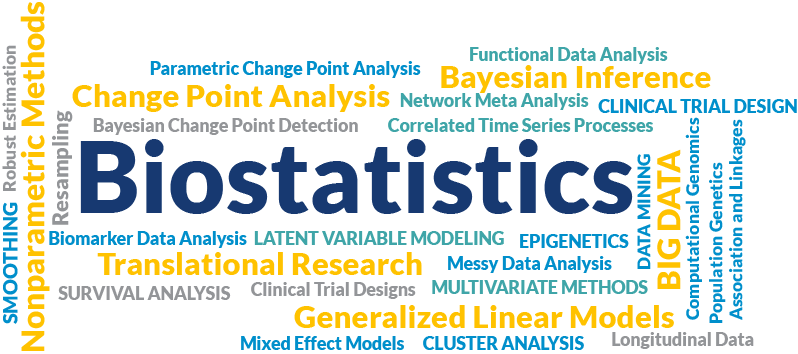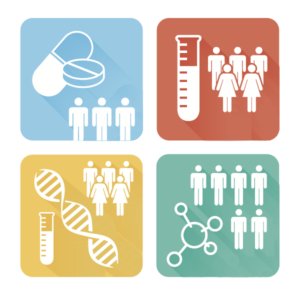Biostatistics in Public Health

What is Biostatistics?
Biostatistics bridges the gap between living organisms and quantifiable data. It is the process of analyzing health and biological data. Biostatisticians are crucial in clinical trials, epidemiology and public health. In clinical trials, Biostatisticians analyze the trial participant’s data. In epidemiology and public health, the study of the exact way in which living things are affected helps to form a picture of what has occurred as well as what may occur in the future. This influences how policymakers decide what actions should be taken to help a population. To read more on Biostatistics, discover our Clinical Biostatistics page Here.
What is Predictive Modelling in Biostatistics?
A critical part of Biostatistics in public health is predictive modelling. This is a statistical process where future events can be predicted using existing data to find patterns and trends. This can be seen in epidemiology, but also screening for individuals who are more likely to be at risk for certain diseases. For diseases like breast cancer, data including age, race, number of relatives who have had breast cancer and other indicators are used to determine if a person should visit their doctor for next steps in prevention or treatment. Breast cancer is a leading cause of death for women around the world, and predictive modelling is helping to prevent deaths by assessing breast cancer risk. Predictive modelling is not limited to cancer and pandemics, but can be used across a multitude of different public health concerns.
As simple as the idea of using data to form conclusions may sound, it is a complex process that begins with determining what data should be collected. Biostatisticians and those at BioPharma Services., use their knowledge of both biology and statistics to help researchers establish what kind of information needs to be gathered to optimize an analysis. Too many kinds of data cannot be properly analyzed at once. A knowledge of biostatistics will establish the proper quantity of data that preserves the quality of the statistical findings.
Clinical Trials and Public Health
Human Clinical trials are performed for a variety of reasons. From the effect certain foods may have on a medication to how a medication may affect people of different ages and genders. The conclusions drawn from different kinds of trials will affect the policies and suggestions public health officials make.
Public health works to prevent serious diseases, including cancer and diabetes, but recognizes that prevention can only go so far and the treatment and care of sick individuals is also their responsibility. The development and improvement of medications for diseases like cancer and diabetes will enhance the lives of those with the disease and aid public health in helping those affected.
Clinical trials are crucial in drug development and are therefore integral in the overall health of communities. The goal of public health organizations is to take informed actions to help the population. Improving the quality of medications available to the public through clinical trials is necessary for this goal.
Clinical Biostatistics is used in clinical trials to analyze and interpret the raw data generated by the test subjects. The biostatisticians will determine what kind of statistics should be used based on the kind of study and will execute the analysis in a way that is compliant with the standards of the necessary associations. Therefore, connecting the medical portion of a clinical trial to the final scientific findings. These scientific findings can then be used by public health services to recommend the best course of treatment for sick individuals.
Biostatistics for Clinical Trials
Biostatisticians implement their knowledge of mathematics, statistics and biology to guide clinical trials to an accurate and thorough conclusion. Without a sense of the context of the data being analyzed as well as the skills to conduct the analysis, the clinical trial would be disconnected. There would be no bridge between the medical portion and the quantifiable results of the trial.
A statistical analysis of clinical data is needed for the outcome of a clinical trial to be understood. In order for the type of analysis chosen to be appropriate for the kind of trial, the statistician must have a complete understanding of the biology behind the clinical trial. The combination of the two disciplines is what determines the sheer significance of biostatistics in public health. The importance of biostatistics in clinical trials, and therefore other areas like public health, cannot be understated.
Why Choose BioPharma Services for our Clinical Biostatistics Capabilities?
BioPharma Services has a team of Biostatisticians who work together with our team of statistical programmers to deliver an accurate statistical analysis quickly and reliably. With years of experience working on clinical research and other health improvement initiatives, the biostatistics department at BioPharma provides the necessary knowledge of biology as well as mathematics and statistics to properly analyze clinical trials.
With the introduction of an Electronic Data Capture platform, clinical trials can be completed faster with the ability to capture Phase 1 data in an accelerated manner. The Electronic Data Capture platform will aid the biostatistics department in expediting timelines while producing high quality results.
Find out why BioPharma might be the right partner for you! Learn more about BioPharma Services and the wide array of bioanalytical services we provide.
BioPharma Services, Inc., a Think Research Corporation and clinical trial services company, is a full-service Contract Clinical Research Organization (CRO) based in Toronto, Canada, specializing in Phase 1 clinical trials 1/2a and Bioequivalence clinical trials for international pharmaceutical companies worldwide. BioPharma has clinical facilities both in the USA and Canada with access to healthy volunteers and special populations.



